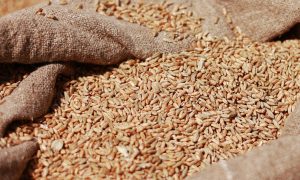Russia-Ukraine conflict has hit Africa’s food security

The illegal invasion of Ukraine by Russia has led to unforeseen consequences, deeply impacting Africa’s food security.
This conflict, a result of human choices, has disrupted the global food supply chain, profoundly affecting African nations. Prior to the conflict, Ukraine and Russia jointly accounted for a substantial portion of global wheat exports, supplying nearly half of Africa’s essential grain imports along with significant quantities of vegetable oils and fertilisers.
Since the hostilities, food supplies from Ukraine have disappeared, leaving African countries increasingly uncertain about relying on Russian exports. This disruption has caused food prices to soar, disproportionately affecting vulnerable nations across Africa.
The shattered food chains pose a significant threat to Africa’s food security, pushing the continent further into turmoil. While diplomatic efforts established the Black Sea Grain Initiative (BSGI) to allow limited agricultural exports from southern Ukraine, this remains a fragile solution. Amid Africa’s existing developmental challenges, this conflict poses an unprecedented struggle for survival. The impact on food security jeopardises the continent’s future. Urgent and unified action from the international community, including influential nations and organisations, is crucial to mitigate the plight faced by African nations.
To secure a sustainable future, immediate collaborative efforts should focus on supporting African countries in boosting domestic food production, reducing costly imports, and fostering regional cooperation in agriculture. Building resilience through minimising dependence on conflict-affected regions is an imperative step forward. Addressing Africa’s immediate food security concerns requires substantial international aid, including financial assistance, technical expertise, and capacity building. Investing in sustainable agriculture and enhancing productivity of smallholder farmers will empower Africa achieve self-reliance.
Reflecting on the aftermath of the UK Global Food Security Summit, it resonates deeply with Africa’s dire predicament. The summit acknowledged Africa’s vulnerability to food insecurity due to various factors such as climate change, conflict and poverty.
It emphasized the pivotal role of African leadership in combating food insecurity and pledged collaboration with African governments, organisations and communities to develop tailored solutions.
The summit fostered discussions on addressing root causes of food insecurity in Africa, focusing on promoting peace, stability, education, healthcare and empowering women and youth. This holistic approach recognises the multifaceted nature of the issue.
Looking ahead, COP28 presents a vital platform to address Africa’s vulnerabilities and food crisis. Discussions should revolve around tailored adaptation and resilience strategies for African countries, considering their heightened susceptibility to climate-related disruptions.
Partnerships and collaboration are crucial, emphasizing alliances between African nations, developed countries, and international bodies to tackle food security challenges.
Integrating discussions on Africa’s pressing food security concerns during COP28 underscores the interplay between conflicts, climate change, and the global imperative for solidarity in securing a sustainable future.














